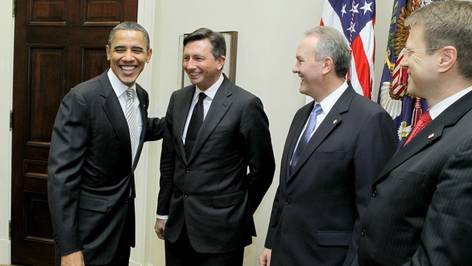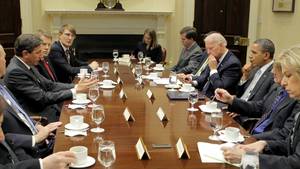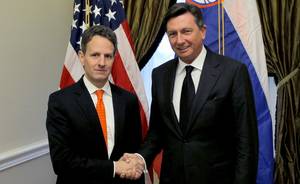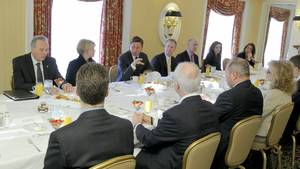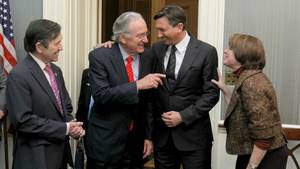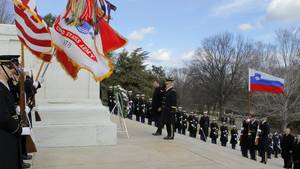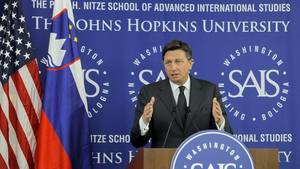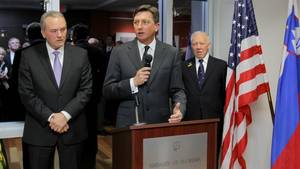NEWS
Prime Minister Pahor about his visit to USA: “We were successful and can go home satisfied.”
After the meeting with the U.S. President Barack Obama and Vice President Joseph Biden, Prime Minister Borut Pahor said that his visit to Washington had contributed to the confidence of the superpower in Slovenia, which, although not an economic, political or military superpower itself, is a credible partner the USA can rely on. At the end of his three-day visit to the USA, Prime Minister Pahor expressed his belief that he and ministers Žbogar and Križanič, who accompanied him on his visit to Washington, had done a good job for Slovenia: “It is very important for our prestige and interests that we have done a good job and may therefore go home satisfied. The American side considers us an equal partner, both politically and economically, and this is our main inspiration for the future. Mutual trust between two credible partners represents the basis for a relationship, on which we can build a constructive and efficient alliance.”
Vice President Joseph Biden who received Pahor in the Roosevelt room of the White House shared the Prime Minister’s opinion that the talks had been very fruitful and constructive. He added that the U.S. President Barack Obama had joined them for half an hour. Mr Biden remembered that he had visited Slovenia, who celebrates its 20th birthday this year, two decades ago, and went on to say that Slovenia has now assumed the leading role in the region. He joked that he would need to find an excuse to visit Slovenia again. Apart from that, Biden said that the talks covered numerous issues, including the Balkans, the EU and other topics.
“Our invitation was extended to Vice President Biden, but perhaps President Obama could find some time too,” said Prime Minister Pahor in his statement to the press following the meeting in the White House. As regards Biden’s visit, the proposal was concrete, which means that this would be more than a mere courtesy visit; however, Mr Pahor did not wish to disclose any further details. The talks in the White House took place in a relaxed atmosphere and touched upon all issues in the interest of both friendly countries. Commenting on the content of the talks, Mr Pahor said: “We began by mentioning a successful resolution of the border issue between Slovenia and Croatia, an outcome which had brought a new impetus and new trust within the region. The American side confirmed that it can continue to rely on Slovenia as a good partner capable of dealing with the situation in the region.” He added that the discussions in the White House and during his entire visit to Washington had also focused on the Brdo process and on the structural reforms in Slovenia.
(Photo: Daniel Novakovič/SPA)
The topics discussed in the White House included Afghanistan and other crisis-affected areas, as well as Guantanamo prison for alleged terrorists; as regards the latter, Prime Minister Pahor explained that the closing of the prison was in the interest of both countries: “The US largely contributed to the resolution of certain issues important to us. We advocated the end of the war in Iraq and the closing of the Guantanamo prison, and at the very beginning of the term of office, when president Obama expressed his wish that the EU Member States accept one or several prisoners each, I said that this was fair of the countries requesting the closing and a sort of a moral obligation of countries which are allies and partners of the USA.” According to the Prime Minister, Slovenia is preparing a legal basis for the reception of a prisoner from Guantanamo, subject to a relevant decision. He did not disclose, however, when this was expected to happen. Mr Pahor only confirmed that he would continue to advocate the reception of a Guantanamo prisoner, and added: “This has nothing to do with meeting Mr Obama. We have already met several times and this is why the present meeting has been all the more relaxed and friendly.” He went on to express his regret about the way the Slovenian public had understood the communication by the American embassy published by Wiki Leaks, although the American embassy itself had clarified that the communication should not be understood as presented to the public.
(Photo: Daniel Novakovič/SPA)
On Wednesday, the last and the most important day of his working visit to the USA, Prime Minister Pahor first met with the U.S. Secretary of the Treasury, Timothy Geithner. The meeting with the American minister of finance had not been announced in the programme of the visit, as Geithner just returned from Brazil where the visit of U.S President Barack Obama is being organised.
The main topics of a constructive one-hour discussion with the American financial counterpart were the recovery of the European Union after the global economic crisis and the comparison with the situation in the USA. Secretary Geithner estimated that the American economy was gaining strength, though slower than desired, and that the US would have to implement numerous difficult measures to catch up with the swift development of BRIC countries. Mr Geithner was pleased with the recovery of the European markets, especially in those countries within the EU, which will be capable of following the German scenario. In Secretary's view, Slovenia also belongs to these countries.
Prime Minister Pahor and the Minister of Finance, Franc Križanič, presented to the Secretary the Slovenian measures to reinforce the competitiveness and Slovenian views of a sustainable mechanism of the EU for overcoming the crisis; the Secretary made a favourable comment and wished Slovenia all success with the pension reform, which, in his opinion, is essential to increase the competitiveness of Slovenian economy. Prime Minister Pahor and Secretary Geithner continued their talks by touching on the situation in the Middle East and agreed that the deterioration of the situation in the region might have a negative impact on global markets, especially when reflected in increased oil prices. Mr Geithner was also interested in the assessment of the stability of Slovenian financial institutions which might, in his opinion, play an important role in the financial markets of the Central and South-Eastern Europe.
(Photo: Daniel Novakovič/SPA)
At the invitation of the US Vice President Joseph Biden, the Slovenian Prime Minister Borut Pahor paid a three-day working visit to Washington, accompanied by the Minister of Finance, Franc Križanič, and the Minister of Foreign Affairs, Samuel Žbogar. The focus of all talks was the strengthening of bilateral cooperation between Slovenia and USA.
On the first day of his visit, Prime Minister Borut Pahor attended the reception of the group of senators organised by a senator of Slovenian origin, Ms Amy Klobuchar. The atmosphere during the reception was highly positive. The discussion particularly focused on friendly relations between the USA and Slovenia and the possibilities to further intensify this relationship. In her opening address Senator Amy Klobuchar stressed the leading role of Slovenia in its region and said she was very honoured to have the opportunity to welcome the Slovenian Prime Minister and his delegation in the Congress. In his address Mr Pahor said that the main purpose of his visit was bilateral cooperation between the two countries, with the emphasis on the economy. On the margins of the reception, the Prime Minister invited the senators attending this event to visit Slovenia.
(Photo: Daniel Novakovič/SPA)
During the working visit, major attention was devoted to the improvement of the Slovenian environment for US investments and the relations between the EU and the USA. On the second day of the visit, Mr Pahor and the ministers thus met with certain American investors in order to discuss a potential increase in American investments in Slovenia. The Slovenian Prime Minister pointed out that Slovenia was a small but open country with stable economy and politics. The Government delegation presented the advantages of the Slovenian economy to the investors: highly qualified and highly capable work force, membership of the EU, Eurozone, OECD, leading economic role in the Western Balkans, favourable legislation as the company income tax is the lowest in the EU, which makes Slovenia even more interesting to the USA. Prime Minister Pahor and the ministers invited investors to participate in joint investments in the broader Western Balkan region. The Government team concluded the meeting by presenting the measures which would further contribute to the improvement of the investment climate, which investors welcomed with great enthusiasm.
(Photo: Daniel Novakovič/SPA)
Prime Minister Pahor continued his visit by delivering a lecture at the Johns Hopkins University entitled "From the Period Twenty Years Ago to 2020: EU-US relations through the eyes of twenty-year-old Slovenia". Mr Pahor particularly described Slovenia's path to independence and certain distinctive problems the country had faced in that period. He sketched the 20-year-long history of the country and presented his political career which had started even before the independence with the position of the youngest member of the Slovenian assembly. He stressed that Slovenia is now a member of the OECD, Schengen area, EU, NATO, Eurozone, and a country with a stable political and economic environment. In its twenty years of history, Slovenia had grown into a democracy, which can serve as an example to its Western Balkan neighbours, and which advocates the European path of other countries in the region. Prime Minister Pahor also addressed the enlargement of the EU to the Balkans and presented his views of this topic. He stressed the importance of a dialogue between the countries and of friendship, which in his opinion, is fundamental in these times of instability. He also talked about the shift of power between the countries of the world and how Slovenia, as a small open economy, enters the competitive world after the global economic crisis. Mr Pahor concluded his lecture by answering certain questions posed by the audience.
(Photo: Daniel Novakovič/SPA)
On the second day of his visit, the Slovenian Prime Minister met with James Steinberg, the US Deputy Secretary of State, to discuss the situation in the Middle East and in the Western Balkans. On the margins of the meeting, Samuel Žbogar, the Slovenian Minister of Foreign Affairs, and James Steinberg, the US Deputy Secretary of State, signed the Agreement between the Republic of Slovenia and the United States of America to share information in the combat against terrorism.
(Photo: Daniel Novakovič/SPA)
On the occasion of the Slovenian cultural holiday, Prime Minister Pahor and his delegation attended the reception at the Embassy of the Republic of Slovenia in the USA, where he opened the exhibition 'Slovenia in US, Lipicanci' by Alenka Slavinec. Prime Minister Pahor took the opportunity to say that he understood the invitation to the White House as the result of the US esteem for the resolute policy regarding the structural reforms and the role of our country in the region, especially as regards the border agreement with Croatia. “This is a working visit, my longest since I took office, and Americans have received us with all respect, which must be understood as an inspiration for the future.” At the Slovenian embassy, the Mr Pahor reiterated the commitment of the Slovenian Government to make Slovenia a part of the German and French model of recovery after the economic crisis, to not hesitate in the strengthening of competitiveness and to become a good business partner of the USA. Slovenia draws additional credibility in this process from its importance in the Western Balkans, while the possibility of joint appearance in the markets of third countries make Slovenia even more attractive for the American side.
The reactions of the American side to the visit of Prime Minister Pahor to the USA were highly positive, and the visit also found major coverage in certain American and other foreign media. Thus it was obvious that the high American politics appreciates the partnership with Slovenia and considers it excellent, while the development of Slovenia from independence until today was described as an incredible success. The USA sees Slovenia in the light of its international connections and memberships (EU, NATO, OECD), as a model for the Western Balkans and all transatlantic integrations; likewise, Slovenia is perceived as the key “engine” among the EU member states in the light of the implementation of the European perspective of the Western Balkans. The talks between the Slovenian and American sides stressed the fact that both countries and governments face difficult reforms in the economic crisis, while being aware that the effects of the reforms are of long-term nature. Similarly, there is a common awareness of the fact that governments were never popular in the time of economic crises. The American side pointed out the contribution of the Slovenian side as regards the armed forces in Afghanistan; they are also aware of the importance of its contribution in terms of the size of the country and its population, with the emphasis on the respect for the principle of solidarity among all Nato members.




